In the Netherlands, if you are buying a bouquet of roses for your partner for Valentine’s Day, you cannot be greedy. Prices usually double, if not triple, as the 14th of February nears.
This Dutch romantic however is spoiled. Typically, what they need to pay in euros during Valentine's Day, their attentive friend abroad needs to produce that on an average day - in euros or dollars or rubles or pounds or any other currency. But with Valentine's, they also see prices going up tremendously. Love hurts.
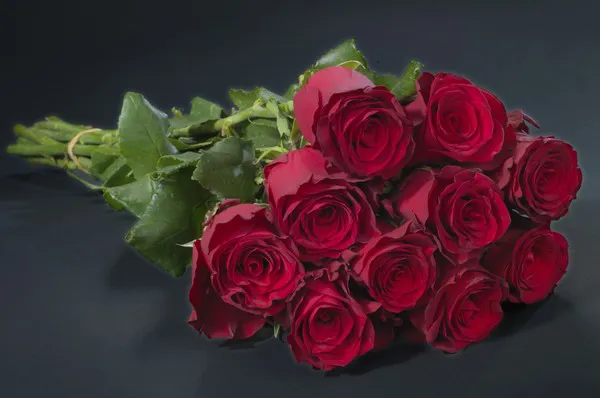
Rhodos, one of the most popular reds in the De Ruiter assortment
But what about this year? As everybody knows, problems with logistics and prices for air freight and supplies both skyrocketed, making prospects uncertain at least. Will growers, in Africa and South America, and European as well as those situated in CIS countries, be able to cope with these extra challenges? Will consumers, who have been spending frivolously since covid entered the scene, be prepared to pay the significant extra?
With the help of De Ruiter Innovations, an international rose breeding company supplying many rose growers worldwide, that might be possible. Despite all the problems, this company sees sales going up, as well as an increase in diversifying the assortment.
Kenya
To start off with African producers, there is no doubt air freight is the number one problem. “We don’t know in what direction it is heading”, Arun Mishra, Head of Flower marketing at Shalimar Flowers, says. “Freight companies are demanding very high charges, but at the same time demand is also very good.”
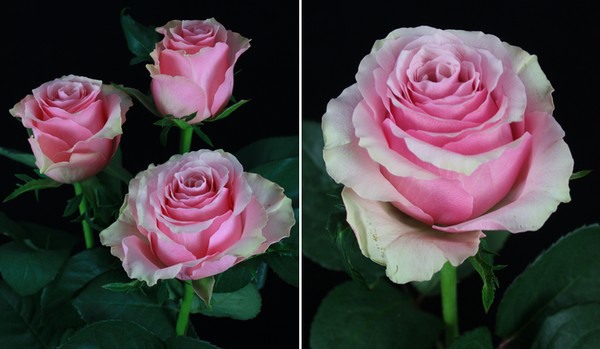
Celeb
“Airfreight and air space have become most critical and serious for this Valentine. Freight charges are gone up almost by 300%. Due to COVID 19 overall freight has increased by 50 to 60 % over freight charges before COVID 19. We are also worried about air freight for Women’s Day”, Kulkarni Santosh, managing director at P J Dave Flora, adds. “Demand (for red roses for Valentine) is good but because of uncertainty regarding air space and high freight charges everyone is under pressure.”
”Considering the current air freight situation we see that we will not have enough space to ship all the flowers even though we have them”, yet another grower, Naren Patel from Subati Group, adds. “Because of that, we have had fewer orders.”
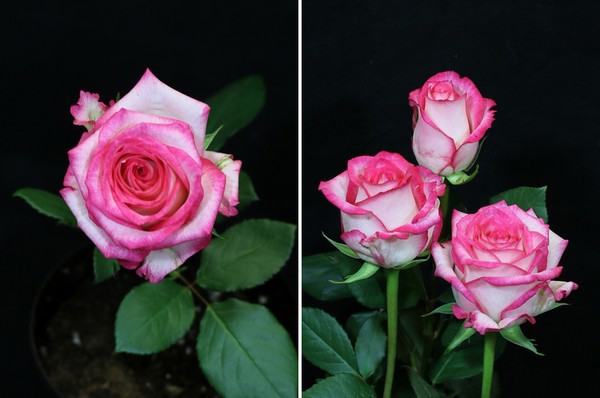
Fluence
“The current freight situation is tough in terms of availability and rates being sky-high”, Ghanshyam Dusang, general manager at Everflora, sums up. “We are definitely looking forward to getting good prices on the clock to digest these unbelievable freight charges.”
Demand is high, but growers report conflicting insights. One saw customers hesitating at first but jumping in later nonetheless. Another points to a lot of confusion due to sudden lockdowns, freight shortage, high rates etc. whereas yet another reports customers pulling back.
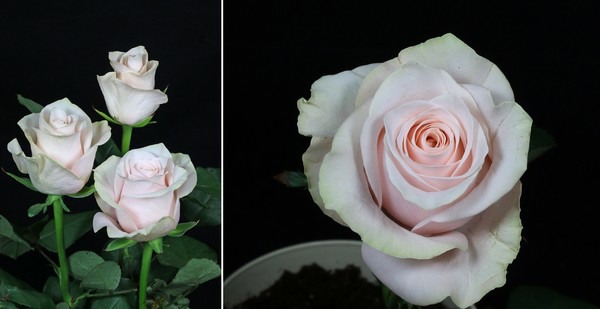 Pomorosa
Pomorosa
With regards to production, they univocally point to both high prices and scarce availability of fertilizers, chemicals, sleeves, and everything else a grower requires. As Santosh sums up: “Production cost has increased tremendously. The major inputs like chemicals, fertilizers, and packing materials have gone up. Some fertilizers costs have gone up by 300%, packaging material costs increased by 50 to 60 % and possibly even more. The production cost is going up but the overall prices of roses are stable or the same. In this scenario, growers are suffering a lot.”
Among Kenyan growers, the most popular red varieties of De Ruiter are Red Calypso, Flanna, and Rhodos. Örjan Hulshof, International Sales, and Marketing Manager, explains: “These varieties have the best vase life, can travel very well, and are very little susceptible to botrytis. However, whereas in the past growers tended to stick with certain varieties, nowadays we see them more eagerly experimenting. That is, also other colors are pitched, and even spray roses gain in popularity.”
South America
In Colombia and Ecuador, different varieties make up the lion’s share. Over the last years, in particular varieties in the X-pression line like Piacere, Pomarosa, Super Sun, Opala, Orange Crush, Nena, and Sweet Unique were popular. Recently the new variety Born Free is breaking ground.
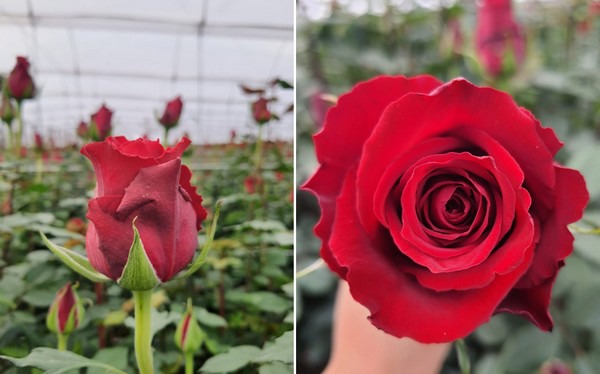
Born Free, in production in a greenhouse in Ecuador
As their counterparts in Africa, roughly the same worries apply. A lack of expensive available air freight space is often mentioned, allegedly also caused by a lack of crew, which again might be an issue caused by covid hampering availability. Especially air space towards Europa and Asia is difficult to find, flights towards Miami and other North American destinations supposedly are more reasonably available.
“As to supplies, we in particular notice a shortage of paper”, Alfredo Pallares with La Rosaleda says. “Therefore farms are struggling with box availability. Luckily in my case this has not been a major problem since I ordered enough product in advance.”
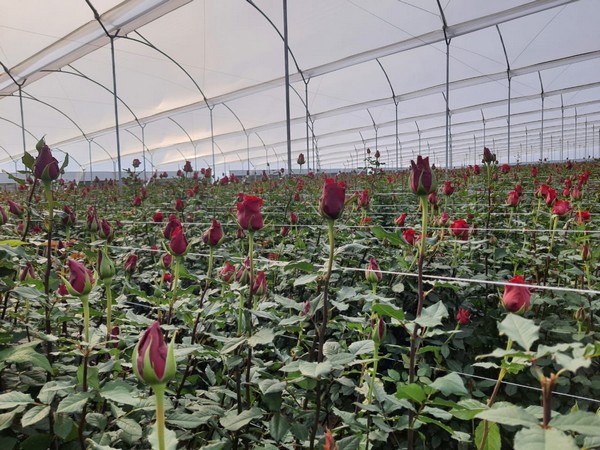
idem, Born Free in production
Concerning demand Pallares does not see anything too exciting. “Demand has been good, but temperatures in Ecuador have been high for at least a month so there are lots of roses too early. That may not be a good thing. It may be too early to compare, but I see an average Valentines in the final result.”
"Supply will probably outweigh demand", Roger Wright with Farmdirect, a Miami-based company importing flowers from Ecuador, estimates. "2021 was a very good year for flowers and many growers increased production for 2022.”
For the second half of 2022, this might be a problem. At the same time, Roger notices, supermarkets are having a hard time finding labor to work the product in their outlets. "This will affect demand as the presentation of the bouquets will not be the best."
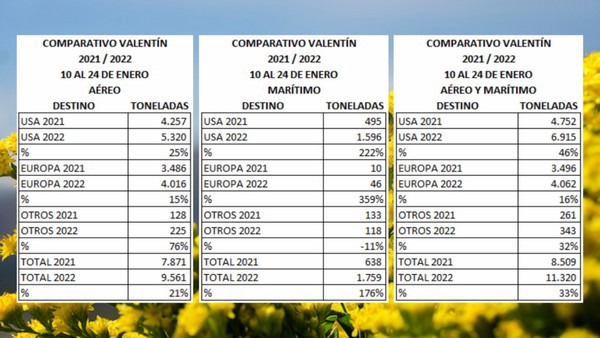 In the graphic Expoflores compares flower exports between 10 and 24th of January by airplane and by boat with last year. Basically all figures have gone up, especially the tonnage sent by boat increased (tripled!) enormously.
In the graphic Expoflores compares flower exports between 10 and 24th of January by airplane and by boat with last year. Basically all figures have gone up, especially the tonnage sent by boat increased (tripled!) enormously.
Eastern Europa
Interestingly, for Women’s day, La Rosaleda does not foresee much sales to Russia at all. Because of covid, high transport costs, growing production at home or for possibly other reasons less obvious, there does not seem to be any flower rush going on. While demand is definitely there – basically sales is continuing everywhere, despite everything being way more expensive as compared to previous years – there is no run, let alone feverish tendencies.
To Marat Gabdulkhaevich Aukchadeev, owner representative of flower farm DCK from Udmurt, Russia, this is no news. “For the past few years, sales on 14.02 did not live up to our expectations in terms of increased demand during this period. We hope for some kind of surge in sales this year.”
“I am expecting an increase in demand”, Eugenia Aleksandrovna Babicheva, General Director of Green House LLC, located in Southern Russia, adds, “but Valentine's Day is becoming less and less popular every year. This is because of the negative campaigning for this holiday. Women's Day, of course, is the most popular holiday for our flower industry, and we plan to provide our regular customers in full.”
“March 8”, Marat Gabdulkhaevich confirms, “is (indeed) another matter. “So far this year trade has been calm, without any jumps in one direction or another. This is perhaps due to a good balance in import and domestic production. During this period traditional active trading picks up, so I want to believe that this year things will go as planned. I think that certain external factors will contribute to a high demand, especially for locally grown flowers.”
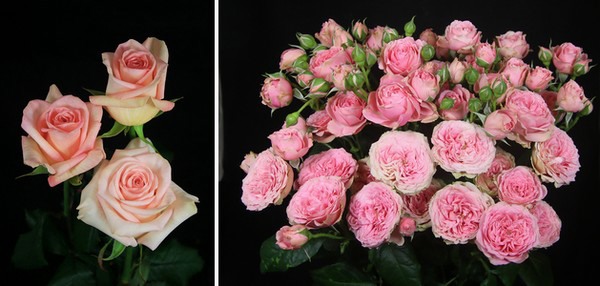
Pink Mood and Special Dimension
OOO "DCK" cultivates several varieties of both single-headed and bush varieties from De Ruiter. “These varieties definitely distinguish themselves in terms of production”, Marat Gabdulkhaevich says. “We sincerely hope that our cooperation will continue for years to come, so that we can maintain our assortment at a competitive level, presenting on the Russian market trendy varieties that will no doubt resonate with our buyers.”
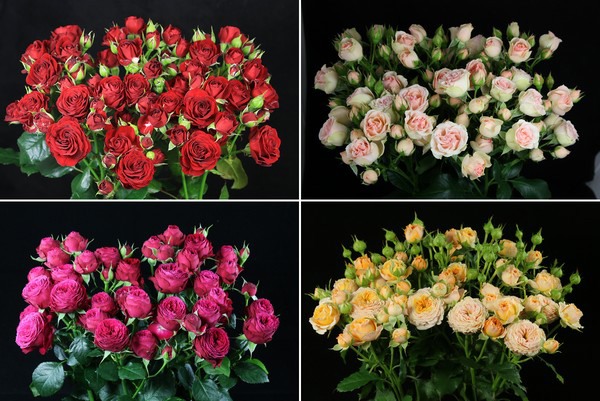
Blush Bubbles, Flirting Bubbles, Sahara Bubbles, Gorgeous Bubbles
“De Ruiter grades are highly demanded by our customers for their variety and excellent quality”, Eugenia Aleksandrovna concludes. “Therefore, it is not difficult for us to sell them. We especially rely on the varieties in the Bubbles spray line (which is very popular on the Russian market).”
Western Europe
Lastly, Dutch rose growers see things particular bleak due to extremely high energy prices. Gas used to cost around 20 cent per cubical, whereas now prices frequently top 1 euro. Those growers who were lucky to fix prices on time, cash in at the cost of (often) their neighbour, who is less fortunate. This situation led quite a few growers to ‘go cold’, meaning they turned down heating and switched of supplemental lighting. Winter had been mild so far, but nonetheless this means production coming to a (partial) standstill. It is estimated for coming holidays produce will be down by around a quarter.
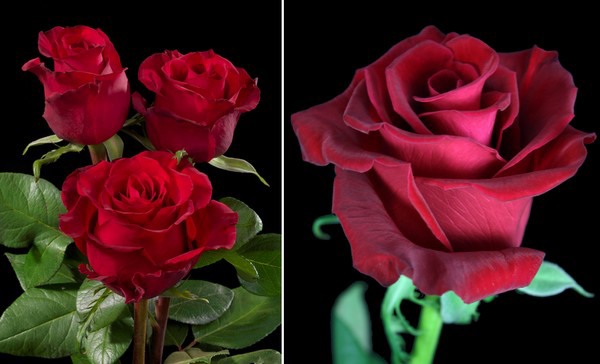
Ever Red
The situation is complex, but in general terms, it can be stated this situation applies to growers in neighbouring countries like Germany, Belgium and Denmark as well. Holland, however, is hit particularly hard because growers rely on gas almost exclusively, while a politically compromised situation in its dealings with Russia, ideologically motivated management leading to closing down its own domestic extraction while importing expensive LNG from North America, and low reserves all drive up prices tremendously. On the positive side, however, there is no doubt that those roses that do hit the market will cash in.
For more information: 
Royal De Ruiter
www.deruiter.com
